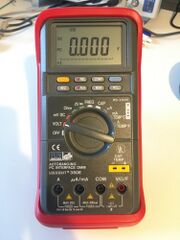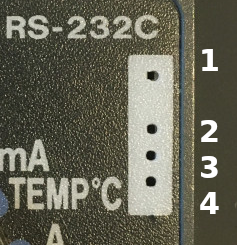Difference between revisions of "Voltcraft VC-350e"
| (15 intermediate revisions by the same user not shown) | |||
| Line 2: | Line 2: | ||
| image = [[File:Voltcraft_VC-350e.jpeg|180px]] | | image = [[File:Voltcraft_VC-350e.jpeg|180px]] | ||
| name = Voltcraft VC-350e | | name = Voltcraft VC-350e | ||
| status = | | status = not supported | ||
| source_code_dir = | | source_code_dir = | ||
| counts = 4000 | | counts = 4000 | ||
| categories = CAT II (750 V AC/1000 V DC) | | categories = CAT II (750 V AC/1000 V DC) | ||
| connectivity = RS-232 ( | | connectivity = RS-232 (Metex) | ||
| measurements = voltage, current, resistance, diode, continuity, temperature, frequency | | measurements = voltage, current, resistance, diode, continuity, temperature, frequency | ||
| features = autorange, hold, bargraph | | features = autorange, hold, bargraph | ||
| Line 21: | Line 21: | ||
* '''Multimeter IC''': [https://www.maximintegrated.com/en/products/analog/data-converters/analog-to-digital-converters/MAX134.html Maxim MAX134] [https://datasheets.maximintegrated.com/en/ds/MAX133-MAX134.pdf datasheet] | * '''Multimeter IC''': [https://www.maximintegrated.com/en/products/analog/data-converters/analog-to-digital-converters/MAX134.html Maxim MAX134] [https://datasheets.maximintegrated.com/en/ds/MAX133-MAX134.pdf datasheet] | ||
* '''CPU''': SAF350E | * '''CPU''': SAF350E (can be found under the LCD, markings on chip: 941d saftec saf 350-98) | ||
* '''Fuses''': 800mA/250V 5x20mm and 20A/250V 6x30mm (superfast, ceramic fuses) | * '''Fuses''': 800mA/250V 5x20mm and 20A/250V 6x30mm (superfast, ceramic fuses) | ||
* '''Battery''': 9V NEDA 1604 or 6F22 | * '''Battery''': 9V NEDA 1604 or 6F22 | ||
== RS-232 pinout and connection settings == | |||
* '''Transfer rate''':1200 baud | * '''Transfer rate''':1200 baud | ||
| Line 37: | Line 37: | ||
[[File:Vc350e-rs232.png]] | [[File:Vc350e-rs232.png]] | ||
{| border="0" style="font-size: smaller;" class="alternategrey sigroktable" | {| border="0" style="font-size: smaller;" class="alternategrey sigroktable" | ||
!Metex-connector pin | !Metex-connector pin | ||
!RS-232 DE9-female pin | !RS-232 DE9-female pin | ||
!Signal (multimeter side) | !Signal (multimeter side) | ||
| Line 60: | Line 59: | ||
To test on a Linux computer using the screen command, open a terminal like xfce4-terminal, gnome-terminal or xterm and start a session, we will use this terminal to display the data coming from the multimeter: | To test on a Linux computer using the screen command, open a terminal like xfce4-terminal, gnome-terminal or xterm and start a session, we will use this terminal to display the data coming from the multimeter: | ||
< | <pre> | ||
/usr/bin/screen -d -m -S serial /dev/ttyUSB0 1200 | /usr/bin/screen -d -m -S serial /dev/ttyUSB0 1200 | ||
screen -r serial | screen -r serial | ||
</ | </pre> | ||
Then open a new terminal to send commands to the multimeter, example to read the current measurements: | Then open a new terminal to send commands to the multimeter, example to read the current measurements: | ||
< | <pre> | ||
screen -S serial -X stuff "$(echo -e '\xE0\xFF\r')" | screen -S serial -X stuff "$(echo -e '\xE0\xFF\r')" | ||
</ | </pre> | ||
Output something like "012.003 V". Often the units show garbled, aka you will see "012.003 �" or something especially when using Ohms. I remember I also had this with the original vendor software (which I no longer have). So maybe my device is poor or it was just never developed better. | Output something like "012.003 V". Often the units show garbled, aka you will see "012.003 �" or something especially when using Ohms. I remember I also had this with the original vendor software (which I no longer have). So maybe my device is poor or it was just never developed better. | ||
Taken from the manual found at [https://www.elektroda.pl/rtvforum/topic2740476.html#13475581 elektroda.pl]. | |||
The following commands can be send over RS-232: | |||
{| border="0" style="font-size: smaller;" class="alternategrey sigroktable" | |||
|C0 | |||
|Yellow | |||
|- | |||
|C1 | |||
|Relative | |||
|- | |||
|C3 | |||
|Blue | |||
|- | |||
|C4 | |||
|Record | |||
|- | |||
|C5 | |||
|Range Hold | |||
|- | |||
|C6 | |||
|Memory | |||
|- | |||
|C7 | |||
|Recall | |||
|- | |||
|C8 AC | |||
|Power Off | |||
|- | |||
|CA | |||
|Power off timeout enable | |||
|- | |||
|CB | |||
|Power off timeout disable | |||
|- | |||
|A0-A6 | |||
|Manual range set | |||
|- | |||
|E0 | |||
|Get measured value read out | |||
|} | |||
All commands must be terminated by hexadecimal FF. Also multimeter will terminate it's response with hexadecimal FF. | |||
== Resources == | == Resources == | ||
Latest revision as of 05:23, 15 September 2020
The Voltcraft VC-350e is a 4000 counts, CAT II (750/1000V) handheld digital multimeter with RS232 connectivity.
It is an OEM version of the Saftec SAF350E. The device was sold by Conrad Elektronik as article 125512 around 1997 and is not available any more.
Hardware
Multimeter:
- Multimeter IC: Maxim MAX134 datasheet
- CPU: SAF350E (can be found under the LCD, markings on chip: 941d saftec saf 350-98)
- Fuses: 800mA/250V 5x20mm and 20A/250V 6x30mm (superfast, ceramic fuses)
- Battery: 9V NEDA 1604 or 6F22
RS-232 pinout and connection settings
- Transfer rate:1200 baud
- Characters: 8-bit
- Parity:none
- Stop bits:1
This device uses what looks like a Metex connector, but it only has 4 pins (where 5 pins is seen on other devices).
| Metex-connector pin | RS-232 DE9-female pin | Signal (multimeter side) | Remarks |
|---|---|---|---|
| 1 | 3 | RxD | |
| - | - | empty space | space between pin 1 and 2 on Metex where there is no pin/hole. |
| 2 | 5 | GND | |
| 3 | 2 | TxD | |
| 4 | 6, 7 | DSR + RTS | DSR and RTS tied together on PC side |
Serial protocol
To test on a Linux computer using the screen command, open a terminal like xfce4-terminal, gnome-terminal or xterm and start a session, we will use this terminal to display the data coming from the multimeter:
/usr/bin/screen -d -m -S serial /dev/ttyUSB0 1200 screen -r serial
Then open a new terminal to send commands to the multimeter, example to read the current measurements:
screen -S serial -X stuff "$(echo -e '\xE0\xFF\r')"
Output something like "012.003 V". Often the units show garbled, aka you will see "012.003 �" or something especially when using Ohms. I remember I also had this with the original vendor software (which I no longer have). So maybe my device is poor or it was just never developed better.
Taken from the manual found at elektroda.pl.
The following commands can be send over RS-232:
| C0 | Yellow |
| C1 | Relative |
| C3 | Blue |
| C4 | Record |
| C5 | Range Hold |
| C6 | Memory |
| C7 | Recall |
| C8 AC | Power Off |
| CA | Power off timeout enable |
| CB | Power off timeout disable |
| A0-A6 | Manual range set |
| E0 | Get measured value read out |
All commands must be terminated by hexadecimal FF. Also multimeter will terminate it's response with hexadecimal FF.

